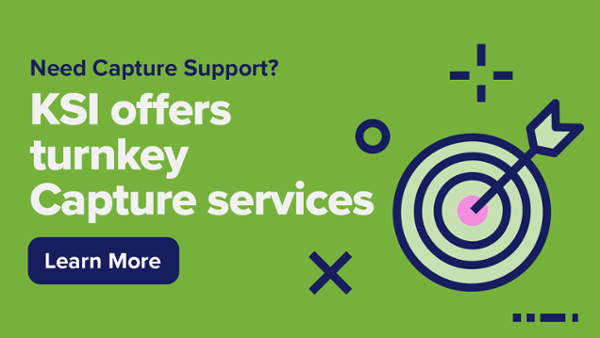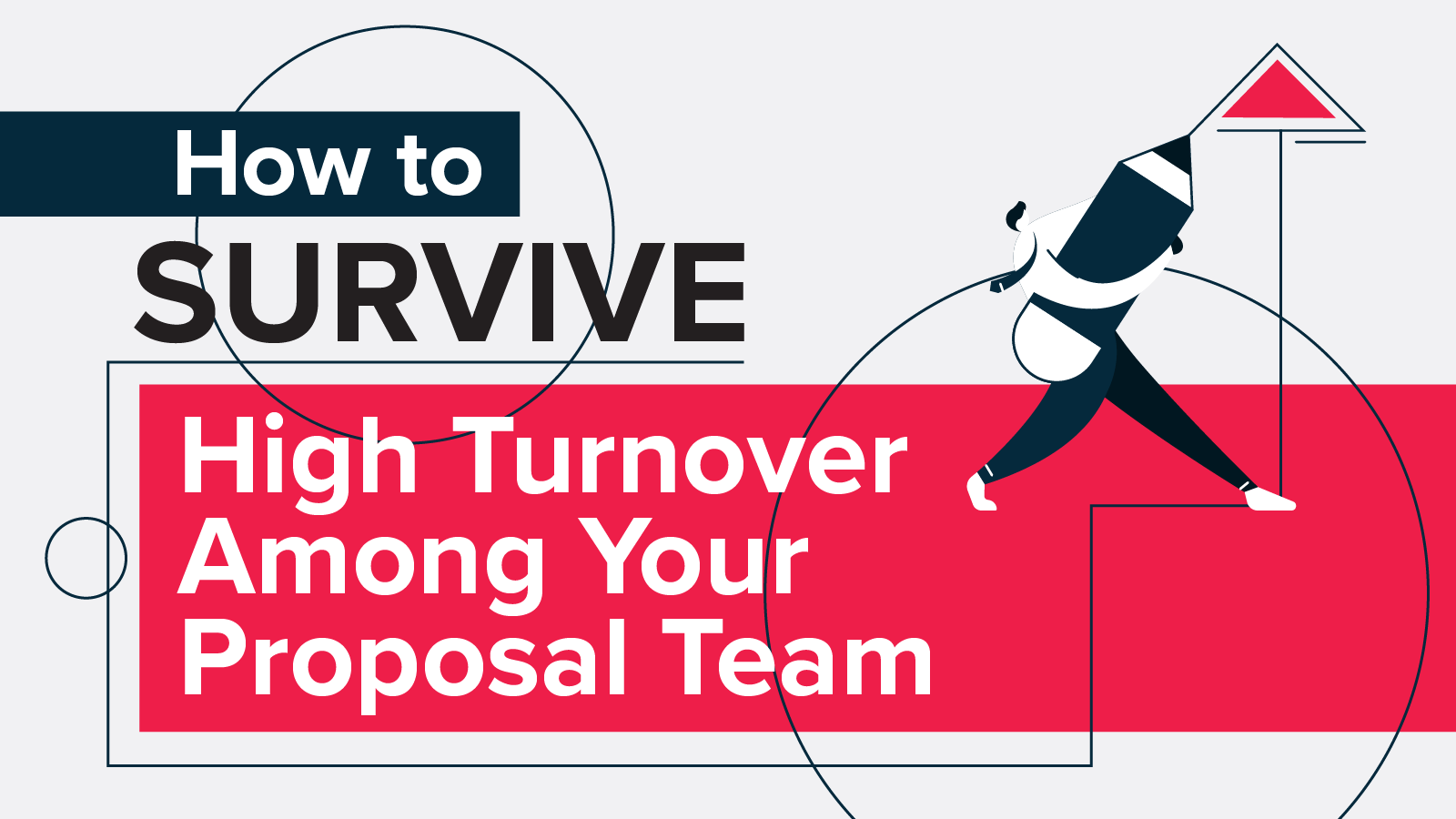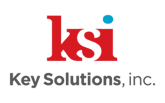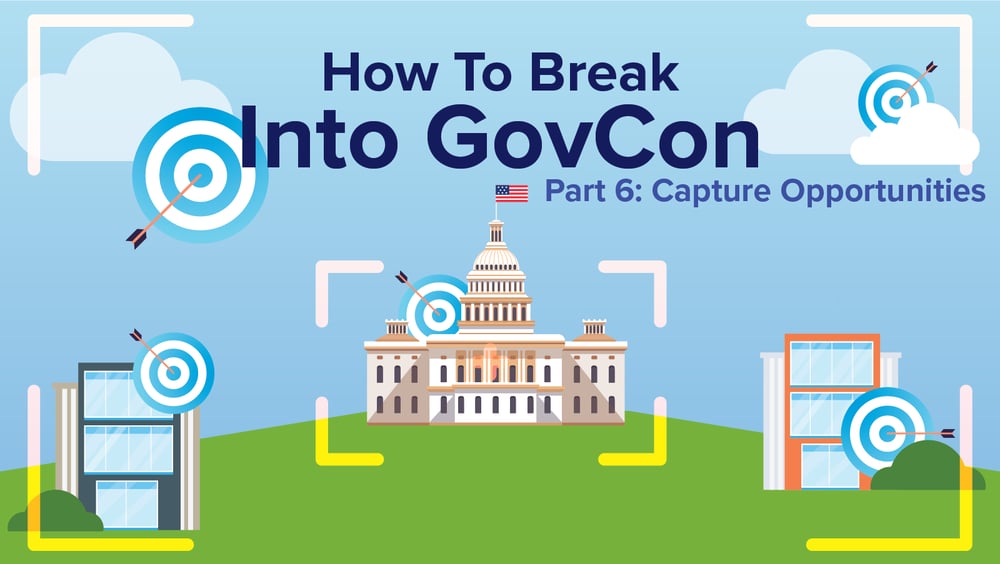
You don’t wake up the morning of the IronMan Triathlon and decide to enter the race on a whim.
It takes months, sometimes years, of training to prepare for such a competitive and grueling event. In some ways, winning work with the federal government is similar. Much like a race, careful planning and preparation are critical to successfully pursue and win contracts.
This is the sixth post in a series of articles focusing on key strategies small businesses (SB) need to know to work with the federal government. The intent is to empower SBs to succeed in federal contracting. In case you missed any, you can access them here:
In this article, we unpack how to Capture Opportunities effectively by examining what happens between opportunity identification and proposal submittal and the elements that make up a successful capture infrastructure.
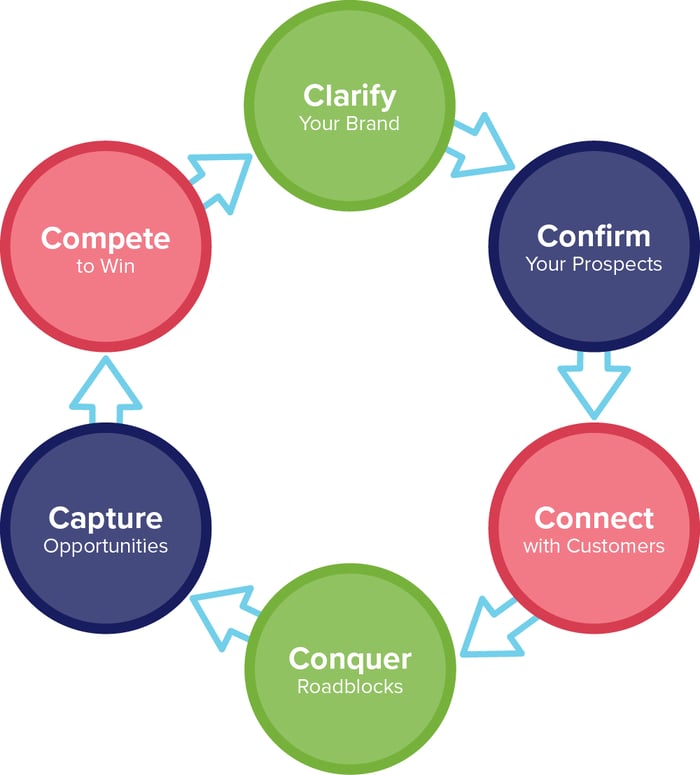
Capture Opportunities—the fifth step to succeed in GovCon
Many believe that the capture phase is the most important part of the bidding process because it has the greatest impact on win rates. That said, effective capture management matters. Small businesses, however, don’t always give capture the time and attention required to improve their probability of winning. A well-defined and structured capture process will ensure resources aren’t wasted by pursuing the wrong opportunities.
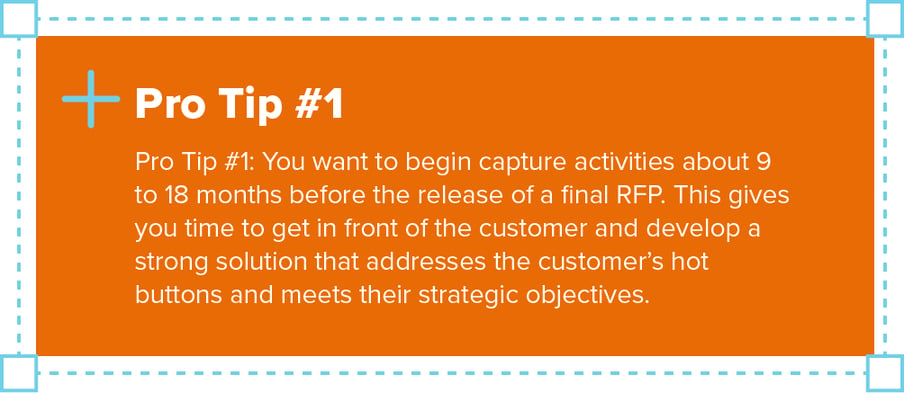
Defining Capture Management
Capture management is separate and distinct from other phases of the business development (BD) lifecycle and involves everything that happens prior to the release of a final Request for Proposal (RFP).
It takes over from sales after a lead has been qualified and provides focused and dedicated attention to pursuing that lead. The end goal of capture management is to “close the sale” by developing a solution and proposal response that wins you work.
Assigning a Capture Manager
A capture manager is a strategic role that supports a company's long-term positioning in the marketplace. Whereas BD managers typically oversee a portfolio of leads and opportunities, capture managers are usually dedicated and assigned to win specific bids. Capture managers most often support large, complex pursuits that would otherwise prevent BD managers from pursuing other leads.
Capture managers are responsible for gathering business intelligence and developing winning solutions that address customer needs in persuasive and compelling ways. Their leadership, insight, and direction help steer and shape the proposal response.
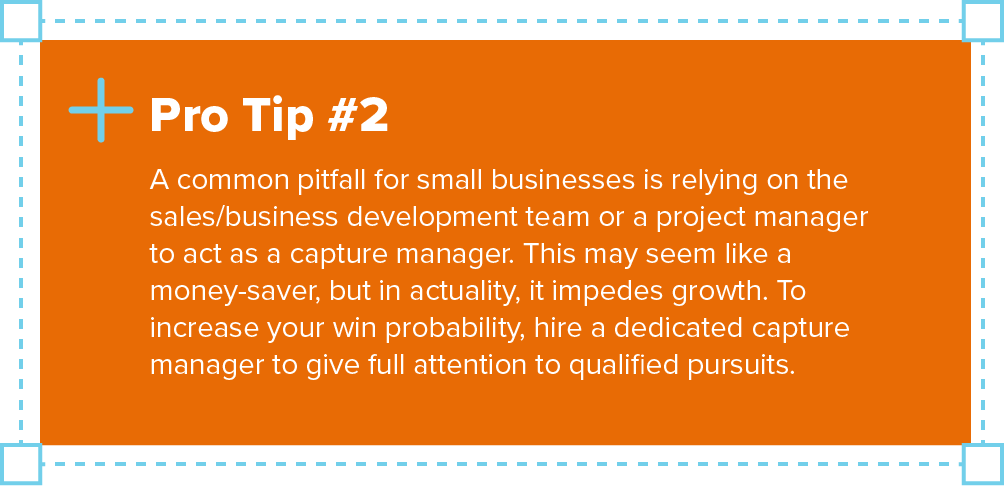
As we explained in a previous article, “The capture manager also works with the proposal manager to share the artifacts that have been developed before an RFP is released. The capture manager bridges the introductory work of the BD account manager and helps the proposal manager prepare a compelling response. This role is key as it helps position the company internally and externally for successful program/contract implementation.”
Ideally, a capture manager has the authority to decide what to offer, to define the pricing strategy, and to shape the presentation of the final solution. They also have the autonomy to identify and allocate the resources needed to win. To maximize your chances of winning, you need to arm the capture manager with everything they need to make winning possible.
Timing of Capture Activities
The capture phase typically happens 9-18 months before a final RFP release. However, some organizations begin the process as far out as 2-3 years. The longer the distance between your capture activities and the final RFP, the better your chances for influencing the customer and developing a solid win strategy. Below is a snapshot of the Capture Phase activities in the KSI Opportunity Lifecycle. A detailed 11x17 version of the KSI Opportunity Lifecycle can be found in the KSI Advantage™ Capture & Proposal Guide.
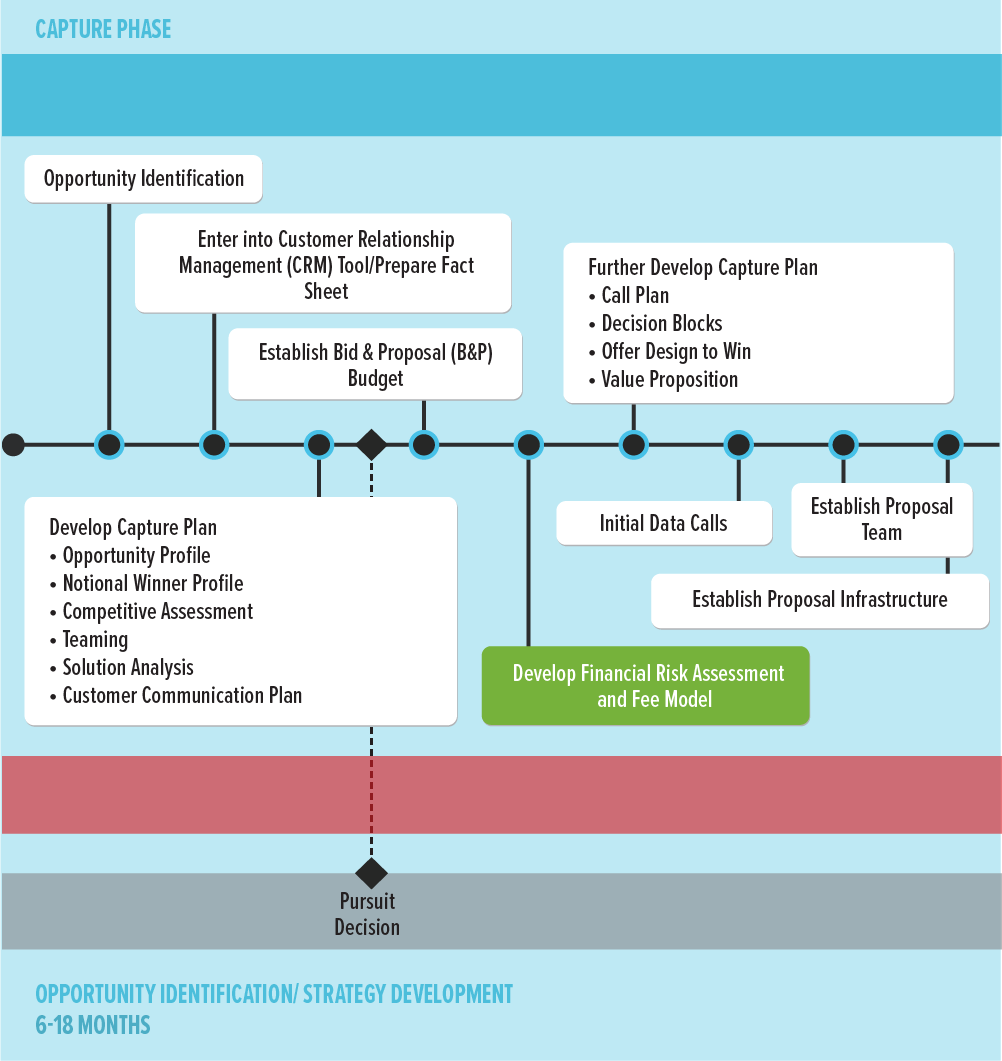
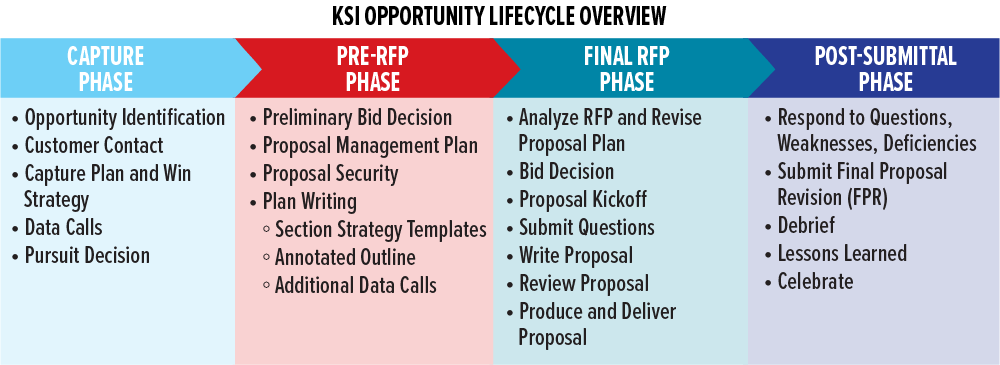
The capture process is both internally and externally focused with the external focus being on the customer and the internal focus being on the proposal team and corporate leadership. You want to build close relationships with both groups to ensure buy-in and support of your proposed solution and capture approach. However, the primary goal of your capture efforts is to present the customer with a solution that helps shape the acquisition approach, define their objectives and evaluation criteria, and position your company as the best value option for meeting their needs.
Capturing Opportunities Effectively
Pursuing the wrong opportunities is costly because it depletes resources and impedes growth. Developing a capture management process that includes a strong bid/no-bid strategy and comprehensive capture plan can reduce the risk of both.
Strong Bid/No-Bid Strategy
You want to pursue opportunities where you have strong relationships and demonstrated success delivering similar products or services. A strong bid/no-bid process strengthens your overall capture efforts by eliminating futile opportunities. You don’t want to waste valuable resources on bids you aren’t likely to win. Improving your bid decision process increases win rates and ensures your pursuits align with your strategic business goals.
Pursuit decisions occur during gate reviews and are influenced by ongoing customer or opportunity intelligence. The capture manager and corporate leadership determine whether to bid, defer, or no-bid. The decision usually hinges on whether you have the capability and resources to pursue the opportunity and then win and execute the work. We often see companies pursue the wrong bids because they fail to strategize effectively. KSI’s Capture + Bid Score™ uses data to strengthen the bid/no-bid process and helps you:
- Calculate how your company might perform on a bid opportunity before ever investing in a response
- Customize Bid Score™ assessment questions and scoring to your company’s unique strengths, weaknesses, and qualification criteria
- Identify key strengths and weaknesses for each bid opportunity to improve your odds of winning
- Develop a capture process tailored to your company
Capturing an opportunity is expensive. Therefore, it’s a worthy investment to build an effective bid/no-bid strategy that ensures your bids are worth the cost of pursuit.
Solid Capture Plan
A capture plan details the resources and strategies needed to win a specific pursuit. Every opportunity needs a customized capture plan based on the size, scope, and complexity of the effort. The capture manager crafts the plan, and it continually evolves as the capture team gathers more information about the opportunity. Capture managers and corporate leadership use the capture plan during bid/no-bid gate reviews.
Proposal managers use it to build the proposal management plan and proposal development teams use it as a go-to resource for competitive messaging and win strategies. Strong capture plans lead to a more efficient and effective proposal process and better position your company for the win. Key elements of a capture plan include:
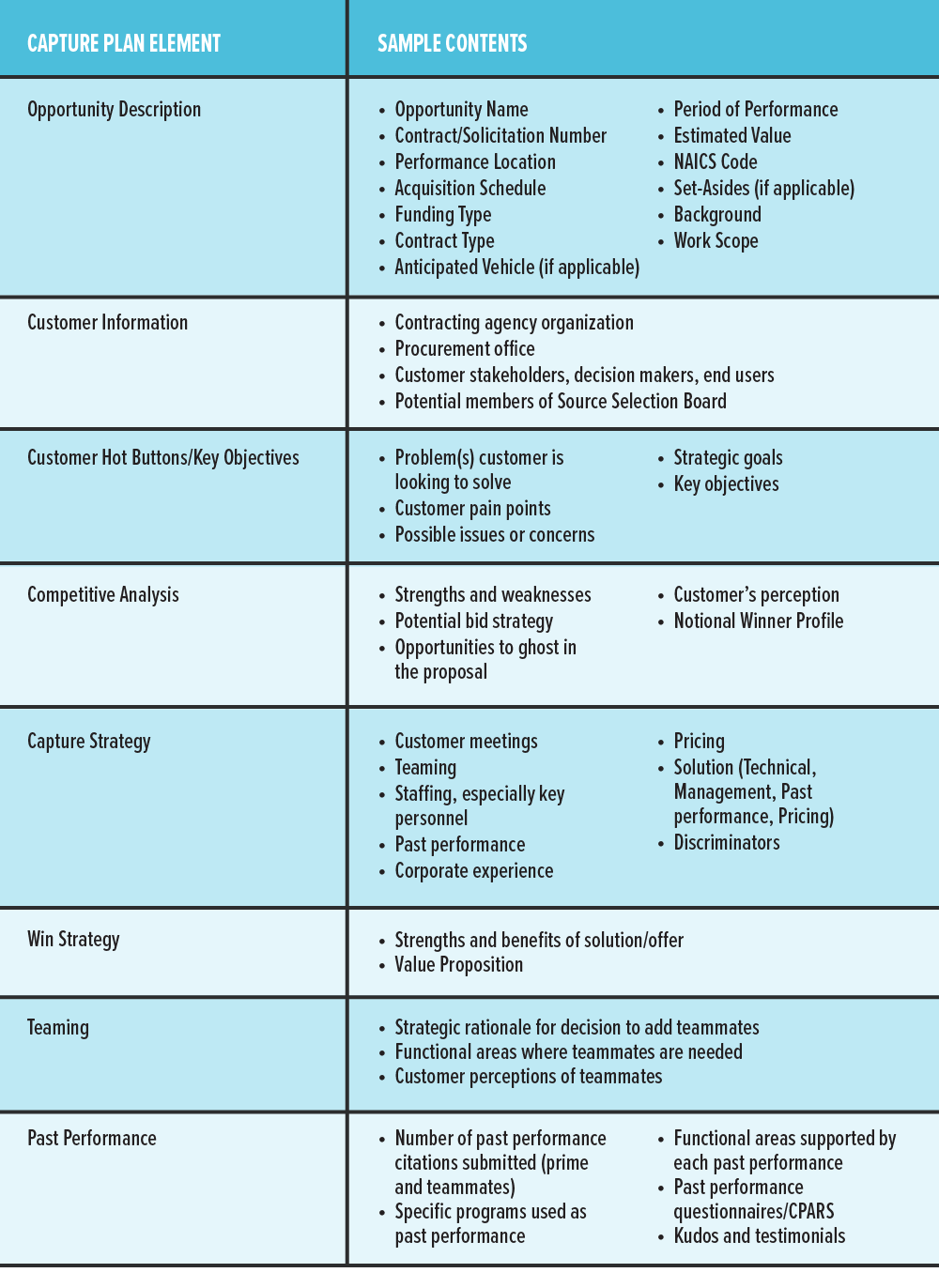 Conclusion
Conclusion
Developing a solid Capture infrastructure is essential for increasing the probability of winning work. It involves gathering information, building relationships, identifying which opportunities to pursue, and strategizing about how to win them. Starting this process early ensures you have ample time to get in front of the customer to develop a strong solution that resonates with them, addresses their needs, and sets you apart from your competitors. The idea is to position your company as the customer’s preferred choice to perform the work before a solicitation gets released.
Call to Action
Many small businesses lack the resources and time to develop a robust capture process. We’re here to help! KSI offers turn-key capture services including:
- Capture Development
- Capture Management
- Capture Training
- Capture Assessment and Process Improvement
- Capture and Bid ScoreTM
References



